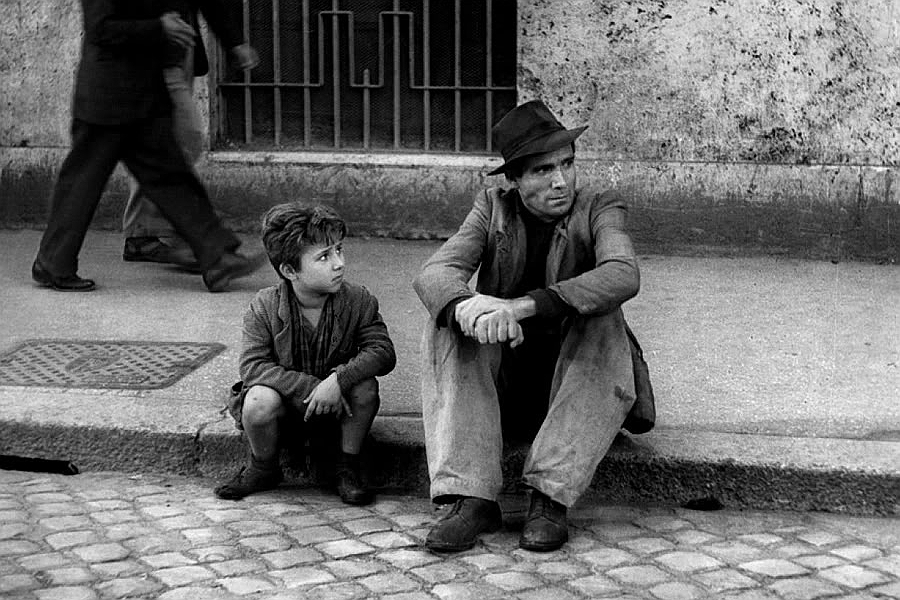Bicycle Thieves – Previewed

Adam Scovell gets to grips with Bicycle Thieves, arguing the classic is unfairly burdened by its era…
There are certain films that come with a great deal of baggage; a constant array of soundbites and terminology, useful in a general sense but meaning very little in the context of actually watching the film. When it comes to the classification of movements and waves in cinema, some films get lost amid the array of “defining achievements of…” and other platitudes. Vittorio De Sica’s Bicycle Thieves or Ladri di biciclette (1948) is one such victim of this pigeonholing, in which it is given the burden of defining a vast amount of films and directors when, in reality, it is itself a very idiosyncratic piece of cinema.
The burden around the neck of Bicycle Thieves is the obsession with its defining of Italian neorealism. It is a heavy one, worn well, but still achingly distracting all the same. Lumped in with a couple films by Rossini and Visconti, it seems unfairly generalised by virtue of its narrative focus. Even early Fellini can’t escape the encroaching wave of neorealism. This narrative focus on the hardships of the everyday people, conveniently ignored by Mussolini and Hollywood, is of course a massive change in the cinematic landscape and does have the feel of an all encompassing wave allowing for a silent majority to slowly be given a voice.
Ironically Bicycle Thieves is better appreciated in its own self-contained world. Instead of being considered next to Rossellini’s Rome, Open City (1945) et al, it has the power to stand on its own, rather than be swept up in a literal tsunami of bludgeoning academia. This is a film that entered the Sight & Sound greatest film poll at the number one spot, just a few years after its release; a feat inconceivable today.
De Sica and writer Cesare Zavattini looked for drama in the most obvious place and found it. Instead of pandering, they produced an honest, brutal drama about post-war Italy that, while sharing themes and ideas with other films branded Italian neorealist, is not solely defined by them. By all accounts, the movement itself is one based more on a change of focus than a true change of visual styles. There is a drift from focussing on more real hardship, but that seems to be one of natural adjustment rather than visual resistance. The story of real Italians may be an emotionally true one but its visuals have more in common with that of pre-Resistance film.
Bicycle Thieves has an interesting narrative, one that shares parallels with the desperation of the working poor today. Desperation is the key word here, as it drives all of the motivations and actions of the lead protagonist, Antonio. After finding a menial (but paid) job putting up posters, Antonio has his bicycle stolen while working. The bicycle, an emblem of hope, is the literal lifeline for the family and the emphasis is placed squarely on the object’s necessity. The film follows his endeavours in trying to get the bike back, though as the situation worsens, he becomes more and more tempted by the type of dishonesty that left him in the situation in the first place.
Paradoxically cyclical and episodic, the film’s events lead from one to another, preempting the impending full circle that Antonio walks blindly in to; the complete injustice that befalls the character is both heartbreaking and horribly inevitable, made all the worse by the presence of Antonio’s son who allows the full dethroning of Antonio to be bitter and utterly devastating. In some ways, the setup could easily resemble a Jacques Tati comedy; the unlucky older man constantly living in bad luck, much to the dismay of his younger relative. It is however, devoid of all whimsy, with the briefest ray of light coming when father and son enjoy a meal in a clearly out-of-their-class restaurant.
Where someone like Ozu dethroned the pompous authority figures of society, Bicycle Thieves kicks the already unlucky while they’re down, this being the reality of Italy. Pasolini was critical of the movement in that, even though it explored Resistance expressions, it lacked the “intellectual strength to transcend the culture which preceded it”. In many ways he is right: the apparent groundbreaking movement has much in common with what came before it, but Bicycle Thieves seems to be more than an exception to this. By moving the focus to everyday hardship, even if an obviously subjective state of play, De Sica’s film highlights and milks dry the best dramatic aspects of this very hybrid and contradictory chapter of cinema.
Adam Scovell
Bicycle Thieves screens Sunday 6pm @ FACT





